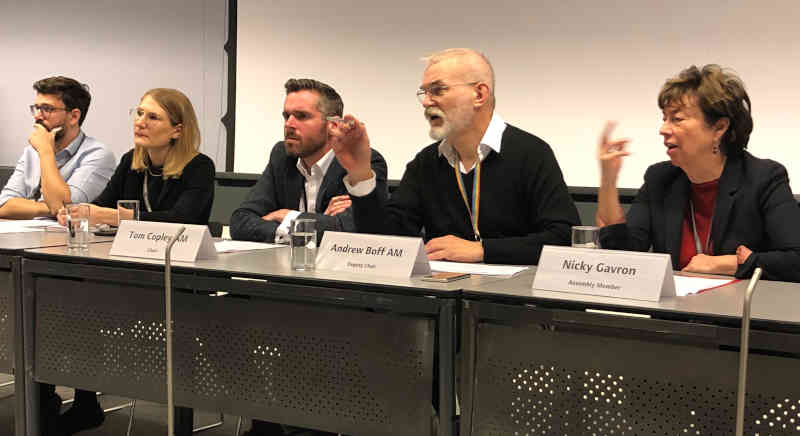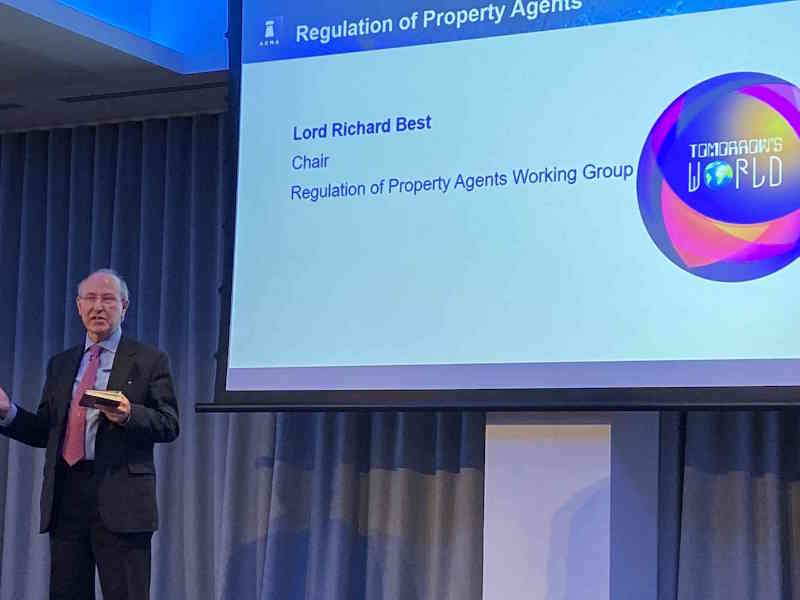
By Sebastian O’Kelly
Shared “ownership” leaseholders gave devastating testimony to the London Assembly last night, with the overwhelming majority – in a show of hands – deeply regretting their decision to enter the scheme.
One of the 30-odd participants at the event described shared ownership as the “pay day loan of housing”, which is being used to deceive those who dream of owning their own home.
The meeting was held by Labour Assembly Members Tom Copley and Nicky Gavron and Conservative Andrew Boff. They are tasked with producing a report on shared “ownership” for the London Assembly.
The Assembly Members were aghast that half the government housing grant to the London Assembly goes to housing associations but “there is no accountability”.
The picture that emerged last night was of a well-intentioned scheme to spread home-ownership – to those who can only afford it in part – being used to ramp up profits for housing associations and their well-remunerated senior executives.
Some share “ownership” tenants feel so strongly about the gap between housing associations’ advertising and the stressful reality that they have twice complained to the Advertising Standards Authority:
It seems as though the ample monetising opportunities of leasehold tenure are being used to the detriment of shared “ownership” tenants.
Why are on earth are housing associations selling leases at 99 years or 125 years – except to game leasehold’s opportunities with extra income from lease extensions?
This would only apply to the minority of shared “ownership” tenants who actually have staircased to 100% ownership: widely believed to be only 7% of the total.
Why are leases not 999 years, except to gain extra income? None at the meeting had a lease longer than 125 years. Why?
The financial implications of shared “ownership” are complex enough, without leasehold games being added to the mix.
Why are housing associations – funded by taxpayers – demanding expensive lease extensions based on bogus mathematical models commissioned by the Grovesnor Estate and other commercial landlords that apply to private leasehold housing?
There is nothing objective or substantive to these models – presently being examined by the Law Commission – so why are housing associations using them?
Why are housing associations using controversial long-term qualifying agreements with commercial service companies, rather than offering section 20 major works out to tender and thus keeping costs down?
These agreements have been highly controversial, with the director of housing of Exeter sent to prison for fiddling them:
LKP is DELUGED by leaseholders caught out in local authority major works schemes …
Why has Notting Hill Genesis offered for sale a flat with £200 doubling ground rent every 25 years only LAST YEAR? This is long after the scandal of ground rents erupted in autumn 2016? The property is here: http://auctions.savills.co.uk/Auctions/LotDetails?pid=0decbb3d-4bdd-4417-ace5-4905983a24f6
Why are there 3% monopoly estate agency charges?
Indeed, why are they seeking to racket up fees when the whole idea is to get people onto the housing ladder, and thus participants in our property owning democracy?
One attendee, who has staircased up to 100% ownership has a lease of 78 years.
“I concentrated on owning the whole flat: that is where I put my savings,” she told the London Assembly members.
“Now my housing association wants £24,000 to extend the lease – plus the £3,000 of its legal and surveying costs and another £3,000 for my own. This lease extension would have cost £2,000 when I first bought the flat.
“Buying in increments to staircase up to 100% ownership has been hugely expensive, and now I have this on top.”
£250 permission fees for new bathrooms and kitchens shocked the panel, along with £150 to re-mortgage. Notting Hill Genesis’s permission fee prices are given here: https://www.genesisha.org.uk/sites/default/files/2018-09/NHG-Leasehold%20Management%20Admin%20Fees%202018-19_0.pdf
The scandal of shared ownership schemes
Getting the keys to a home of your own is a moment no one ever forgets. Yet for Alex Tan, buying his first flat has become memorable for all the wrong reasons.
Tenants will be allowed to buy tiny shares of their homes every year
New plans will allow renters to purchase 1 per cent a year of value of property Housing secretary says the changes will make it easier for those trying to buy But MP Sarah Jones says tinkering with shared ownership details is ‘meaningless’ Tenants will be able to buy tiny shares of their homes every year under plans announced by ministers to help thousands step onto the housing ladder.
The 1% tiny increment proposal to staircase into 100% ownership was not well regarded by the audience: they knew the fees housing associations would levy for each and every increment
One attendee said: “I have got a PhD, and I feel a complete idiot. All I have bought is a share of a wasting asset. Those considering shared ownership need to be warned.”
Assembly Member Nicky Gavron said: “I was going to ask whether you feel like home owners – but obviously not!”
A number of housing associations were named in the most unflattering terms, including Genesis Notting Hill, A2 Dominion, London and Quadrant, Metropolitan and Catalyst.
A group of four shared “ownership” activists has formed, one of who asked why housing associations are not covered by the Freedom of Information Act?
“There is a complete lack of transparency in this whole sector,” said one
“Those considering shared ‘ownership’ need to consider all the implications and be far better informed.”
Only one attendee – who had worked for a housing association – spoke up for shared ownership, but he had no intention of staircasing his 50% share.
“It is not ideal, but with no social housing available it is better than nothing and cheaper than renting.”
Shared “ownership” activists have prepared the following “Explanatory information for new buyers”, which was presented to the London Assembly
The explanatory information is misleading at best, and in many cases is so inaccurate it borders on mis-selling. The reason for this mis-selling is that if people knew what shared ownership actually involved, they wouldn’t touch it with a pole.
Facts of shared ownership that are not disclosed during the sales process include:
1. Buyers are told they will own their share. This is NOT true. All you have is an assured tenancy for the duration of the lease. This means that if you get into rent or service charge arrears, the housing association can repossess your property without buying back the share that you bought from them, either at the market rate at the time of the repossession, or even just giving you back the money you gave them for it.
2. The issue of lease duration and marriage value is not mentioned at all – the value of any leasehold property decreases as the length of the lease goes down, and if it gets to 80 years it becomes virtually impossible to sell unless you extend the lease
3. There is no legal right to lease extension of shared ownership properties, and if a housing association grants you an extension you can face bills of between 5k – 20k or more for the privilege.
4. Much is made of staircasing, but the fact is that unless and until you staircase to 100% all you have is an assured tenancy for the duration of the lease. There are no centrally held figures regarding the number of shared ownership tenants who have staircased to 100% but the best estimate is 7%. This means that 93% of shared ownership tenants never reach the goal of full ownership of their shared ownership property.
5. The implications of service charge and its interminable increases in the face of ever decreasing levels of service are likewise never explained. We are told we will have to pay service charge. We are left to find out what that actually means in real terms after we have signed the contract.
6. Selling is another issue. Tenants have to pay 100% of the HAs fees for selling their property (usually around 3% of the total value) regardless of the share that they own. They have no choice in using the HA, and often have to use their valuation, too.





 ARMA: prepare for a regulated leasehold management world
ARMA: prepare for a regulated leasehold management world






















Even murkier, have a look at pre-emption rights retained on 100% staircased shared ownership leases (in particular by councils e.g Islington) yet these properties are still being sold at full market rate. Most solicitors are OK with Right of First Refusal, but many aren’t and that can collapse a sale = Russian roulette. The council of mortgage lenders also makes clear in their handbook that pre-emption rights are to be regarded as a restriction that require special consideration on a case by case basis. This means that anyone who owns one of these leases cannot engage in the property market as a regular participant and therefore the property surely cannot be considered at full market value. The government issued model leases in 2016 that specifically advised removal of pre-emption rights by councils and HAs, yet many chose to ignore the advice, again take Islington council as an example. It is a complete grey area and needs to be addressed properly as it can ruin people’s lives.